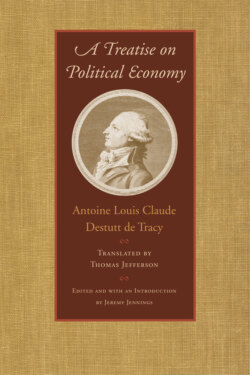Читать книгу A Treatise on Political Economy - Antoine Louis Claude Destutt De Tracy - Страница 56
На сайте Литреса книга снята с продажи.
OBSERVATION.
ОглавлениеThe effect of this operation is to recall to ourselves, or to those whom we wish to convince of the truth or falsity of a proposition, the elements of the subject which implicitly comprehend the proposed attribute, or which on the contrary may exclude it.
It is the object which the logicians propose to attain by what they call definitions; but in my opinion they fall into several errors relatively to definitions, and they greatly mistake their effects and properties.
1st. They believe that there are definitions of words, and definitions of things, while in truth there are none but definitions of ideas. When I explain the sense of a word, I do nothing but explain the idea which I have when I pronounce that word, and when I explain what a being is, I still do nothing but explain the idea I have of that being, and which I express when I pronounce its name.
2d. They aver that definitions are principles, and that we cannot dispute about definitions. These two assertions are contraries, and yet both of them false.
In the first place they are contradictory, for if definitions are principles, we can and we ought frequently to question their truth, as we ought never to recognise any principle as true without a previous examination, and if we cannot contest definitions, they cannot be principles, since every principle should be proved before it is admitted.
Again, these two assertions are both false. definitions are not principles; for facts are the only true principles; and definitions are not facts, but simple explanations founded on facts, as all our other propositions whatsoever. Now we may contest a definition, as every other proposition; for when I explain the idea that I have of a being, I do not pretend to say merely that I have this idea; I pretend also to affirm that this idea agrees with that being, and that we may so conceive it without error; now this is what may be false, and what may be contested. So also when I explain the idea which I have of the sense of a word, I do not solely pretend that I have this idea, I pretend further that it does not affect the real relations of this word with an infinity of others, that we may employ it in this sense without inconvenience and without inconsequence; now this is what again may be contested with reason. In fine, if I should pretend by a definition only to explain the complex and compound idea that I have actually in my head, yet it should always be allowed to show me that this idea is badly formed, that it is composed of judgments inconsequent the one to the other, and that it includes contradictory elements.
Then definitions never are principles, and yet they always are contestible.
3dly. The logicians have believed that the definition is good, and that the idea defined is perfectly explained when they have determined it, per genus proximum et differentiam specificam, as they say; that is to say, when they have expressed that one of its elements which constitutes it of such a genus, and the one which in this genus distinguishes it from the ideas of the neighbouring species. Now this is still false, and is only founded on the fantastical doctrine, in virtue of which they believed they were able to distribute all our ideas into different arbitrary classes called categories.
That is false, first, because these arbitrary classifications never represent nature. Our ideas are connected the one to the other by a thousand different relations. Seen under one aspect they are of one genus, and under another they are of another genus; subsequently each of them depends on an innumerable multitude of proximate ideas, by an infinity of relations, of natures so different that we cannot compare them together, to decide which is the least remote. Thus we can never, or almost never find really the proximate genus or specific difference which deserves exclusively to characterise an idea.
Moreover, if we should have found in this idea the elements which in fact determine the genus and species in which it is reasonably permitted to class it, the idea would still be far from sufficiently explained, to be well known.
These two elements might even be absolutely foreign to the decision of the question which may have given place to the definition. Assuredly when I say that gold is a metal, and the heaviest of metals except platina, I have correctly ranged gold in the genus of beings to which it belongs, and I have distinguished it by a characteristic difference from those nearest to it in that genus. Yet this does not help me to know whether the use of gold, as money, is useful to commerce, or pernicious to morality, nor even whether it is the most ductile of metals. The two first questions depend on ideas too foreign to those which fix gold in a certain place amongst metals; and though the latter may be less distant, yet we do not know the direct and necessary relation between weight and ductility.
Logicians have been mistaken respecting the nature, the effects and properties of definitions. They are incapable of answering the end which they propose to attain by their means, that of presenting the idea of which we are to judge in such a manner that we cannot avoid forming a just judgment. The only mean of attaining this is to make the best description possible of the idea, and with the precautions which we have indicated.
